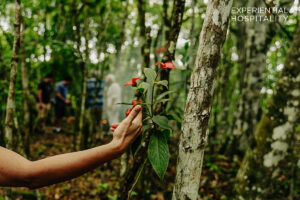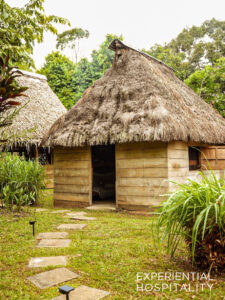By Julieta Chan and Jesús Parrilla
Much discussion today around sustainability centers on the environmental dimension, but little attention is given to human sustainability and the crucial role humans play in driving sustainable growth and innovation across environmental and governance sectors.
Sustainability is not just about preserving our natural resources; it’s about cultivating a deep, harmonious relationship with our environment, much like the ancestral cultures that have thrived in balance with nature for centuries. The travel industry stands to learn invaluable lessons from these communities, whose wisdom and practices can guide us towards a more sustainable future. By fostering sustainable practices, we can mitigate climate change, preserve biodiversity, and promote equity and justice across all communities.
Over the past two decades, our separate journeys to remote areas of the Americas—including the Brazilian Amazon, Bolivian high plains, Peruvian Andes, Colombian Sierra Nevada, the American Southwest, and Costa Rica’s Maleku of Cote—have allowed us to witness firsthand the profound connection that indigenous peoples maintain with their surroundings. These communities, most of them still largely untouched by modern society’s frenetic pace, possess a profound understanding of planetary health, viewing the Mother Earth as a living entity where every element is interconnected. What has struck us most about these diverse cultures is their incredible bioliteracy and shared ethos: a mysticism and a profound relationship of love, respect, and harmony with nature and all living things. Whether discussing land preservation or the impacts of climate change, the indigenous peoplesarticulated with remarkable clarity how they perceive more pronounced natural phenomena beyond the usual cycles of La Niña or El Niño. Their observations underscore a critical and irrefutable truth: while our planet will continue to evolve, humanity must act quickly and learn to adapt and live in balance with the Earth’s natural rhythms.
 This philosophy is evident in their sustainable practices, which have been honed over generations. Traditional building techniques, for example, use local materials like adobe, bamboo, and thatch, which are not only environmentally friendly but also ideally suited to their climates. These methods minimize environmental impact and enhance resilience, offering urban populations valuable lessons in sustainable living.
This philosophy is evident in their sustainable practices, which have been honed over generations. Traditional building techniques, for example, use local materials like adobe, bamboo, and thatch, which are not only environmentally friendly but also ideally suited to their climates. These methods minimize environmental impact and enhance resilience, offering urban populations valuable lessons in sustainable living.
Moreover, the indigenous approach to water management—through rainwater harvesting, terraced fields, and sophisticated irrigation systems—demonstrates an intricate understanding of local ecosystems. These practices ensure efficient resource use, reduce soil erosion, and boost agricultural productivity. They practiced sustainable living, taking only what they needed and ensuring that resources were available for future generations. Such wisdom is crucial for modern societies facing water scarcity, food shortages, and climate variability.
Fire management, as a regenerative initiative, is another area where indigenous knowledge excels. They use controlled burns to manage plant growth, encourage the growth of certain plants, and prevent larger wildfires, which in turn makes the land more productive for hunting and gathering. Their knowledge extends to medicine, where an intimate relationship with nature has led to the development of effective herbal remedies. This traditional medicinal knowledge not only provides 3 healthcare solutions in remote areas but also enriches the global pool of effective alternative and complementary medicine.
The tourism industry has a unique opportunity. It can play a key role in connecting this ancestral community and its unique culture and knowledge to people all over the world, who can learn, get inspired by it, and benefit the health of our planet. Transformative experiences with and for the communities benefit the culture and knowledge of the travelers, allow a better understanding of our world, and create bonds and long-lasting connections. By creating memorable experiences, bioliteracy can be taught to travelers, transforming everyone’s relationship with nature.
In doing so, travelers become ambassadors for sustainability, advocating for the protection of these invaluable traditions. This cultural exchange promotes a future where ancient wisdom and modern innovation coexist, ensuring that the rich heritage of indigenous knowledge continues to benefit future generations.
 In crafting travel experiences and developing hospitality concepts that draw inspiration from ancestral spirituality and environmental stewardship, we can help bridge the gap between modern society and the timeless wisdom of indigenous cultures. Private citizens, travel companies, and industries must collectively recognize the rights of nature and commit to working towards a balanced, inclusive, and resilient world. We have a fiduciary duty to our planet and all of its inhabitants, and by embracing the lessons of our native peoples, we can move closer to achieving true human sustainability or even, more than that, restore this natural relationship with nature, people, and ourselves.
In crafting travel experiences and developing hospitality concepts that draw inspiration from ancestral spirituality and environmental stewardship, we can help bridge the gap between modern society and the timeless wisdom of indigenous cultures. Private citizens, travel companies, and industries must collectively recognize the rights of nature and commit to working towards a balanced, inclusive, and resilient world. We have a fiduciary duty to our planet and all of its inhabitants, and by embracing the lessons of our native peoples, we can move closer to achieving true human sustainability or even, more than that, restore this natural relationship with nature, people, and ourselves.
In closing, it is important to acknowledge that without humankind’s participation, it is impossible to restore this balance. We believe it is important to remember what Jacques Cousteau said: “People 4 protect what they love.” Tourism allows people to connect with nature and different cultures and fall in love with them. This is the sustainable tourism industry: to make people love this planet.
About the authors:
Julieta Chan
Serving as the ESG and Project Support Manager at Experiential Hospitality, Julieta Chan is a dynamic professional with 15 years of expertise in experiential hospitality, luxury travel administration, and operations support. Julieta is a staunch advocate for empathic communication and regenerative travel, dedicated to fostering meaningful and sustainable experiences in the hospitality industry. Jesús Parrilla As the CEO and Principal of Experiential Hospitality,
Jesús Parrilla
Jesús embodies the essence of a global citizen, driven by an enduring passion for the outdoors. His career has been profoundly shaped by this commitment, leading him to champion companies that prioritize responsible, sustainable, and ethical business practices. With a diverse skill set, Jesús brings 25 years of experience spanning management, operations, sales, marketing, communications, and business development.

